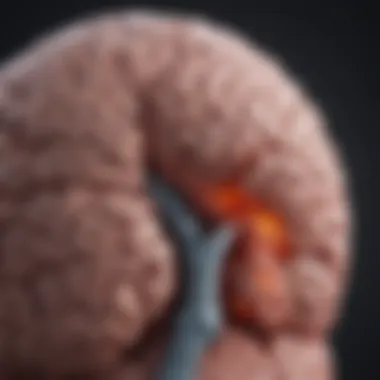Survival Rates in Stage 4 Lung Cancer with Brain Metastasis


Intro
Understanding lung cancer with brain metastasis is crucial for both patients and healthcare providers. This condition involves complex interactions between cancer cells and the central nervous system, significantly impacting patient outcomes. As stage 4 lung cancer presents serious challenges, knowing survival rates helps establish expectations and guides treatment choices.
Research shows that the five-year survival rate for stage 4 lung cancer varies, particularly when metastasis occurs in the brain. The prognosis can shift based on individual circumstances, such as response to treatment and the extent of metastasis. This article uncovers these vital components to provide a comprehensive understanding of the prognosis and survival rates.
Research Background
Overview of the Scientific Problem Addressed
Lung cancer remains one of the leading causes of cancer-related deaths worldwide. When this disease metastasizes to the brain, the prognosis worsens significantly. Understanding the survival rates for this advanced stage of cancer is crucial for addressing patient needs and expectations.
Historical Context and Previous Studies
Historically, studies have shown that survival rates for lung cancer patients drop sharply once the disease reaches stage 4. Research in the past focused primarily on general survival statistics without specifically highlighting the subsets of patients with brain metastases. Recent studies, however, have begun to explore the nuanced effects of brain involvement on overall survival, revealing that patients face additional challenges, such as neurological deficits and altered treatment responses. Effectively, these investigations now guide healthcare professionals in providing hopeful yet realistic information to patients and their families.
Findings and Discussion
Key Results of the Research
Recent data indicate that the median survival for stage 4 lung cancer patients with brain metastasis can be as low as six months to one year depending on various factors, such as the type of lung cancer and treatment regimen. Factors affecting survival rates include:
- Type of Lung Cancer: Non-small cell lung cancer (NSCLC) generally has a different survival trajectory compared to small cell lung cancer (SCLC).
- Extent of Metastasis: The number and size of brain metastases play a critical role in overall survival.
- Patient Health: A patient's overall health, including age and comorbidities, affects their resilience to treatment.
Interpretation of the Findings
The implications of these findings suggest that while brain metastasis presents significant challenges, advancements in treatment approaches, such as targeted therapy and immune checkpoint inhibitors, show promise. The right therapeutic strategy can markedly improve survival outcomes and the quality of life for affected patients.
"Effective treatment planning involves a comprehensive assessment of both cancer characteristics and the overall patient condition, taking into account the complexities of brain metastasis."
Preface to Stage Lung Cancer
Understanding stage 4 lung cancer is crucial due to its implications on survival outcomes. This phase represents the advanced stage of the disease where cancer cells have spread beyond the lungs to other parts of the body, including vital organs like the brain. The focus on survival rates in patients facing such a dire situation is paramount, highlighting the interplay between early diagnosis, treatment options, and individual patient factors that contribute to prognosis. Having clarity on stage 4 lung cancer can inform better decision-making and management plans for both patients and healthcare providers.
Definition and Challenges
Stage 4 lung cancer is defined as a metastatic stage where cancer has spread to distant sites. This stage is sometimes referred to as "advanced lung cancer," and it presents significant challenges for treatment. The prognosis at this stage is often poor, with average survival rates being considerably lower than in earlier stages. Factors such as the overall health of the patient, location of metastasis, and response to therapies can complicate treatment decisions. The psychological impact of such a diagnosis can also not be overlooked, affecting both the emotional well-being of the patient and family members.
Overview of Lung Cancer Types
Lung cancer is categorized mainly into two types: non-small cell lung cancer (NSCLC) and small cell lung cancer (SCLC). NSCLC accounts for approximately 85% of lung cancer cases and is typically slower growing than SCLC, which is more aggressive.
- Non-Small Cell Lung Cancer (NSCLC): This type can further be divided into subtypes, including adenocarcinoma, squamous cell carcinoma, and large cell carcinoma. Each subtype has unique characteristics regarding growth patterns and response to treatments.
- Small Cell Lung Cancer (SCLC): Known for its rapid progression, this type primarily affects smokers and has a tendency to metastasize early. It typically presents a different set of management challenges compared to NSCLC.
Understanding these distinctions is vital for developing a treatment strategy tailored to individual patient needs.
Understanding Metastasis
Understanding metastasis is vital for comprehending stage 4 lung cancer, especially in cases where the disease has spread to the brain. In this complex condition, the initial tumor cells have migrated from the lungs, creating new sites of cancerous growth. This movement not only complicates treatment options but also impacts the prognosis significantly. By grasping how metastasis occurs, patients and healthcare providers can make more informed decisions regarding treatment and management.
Mechanisms of Metastasis
Metastasis is a multi-step process. It begins when cancer cells invade surrounding tissues. These cells can break away from the primary tumor and enter the bloodstream or lymphatic system. Once in circulation, they travel to different parts of the body. There, they can settle in new locations, such as the brain, and start new tumors. Several factors influence this process, including the characteristics of the cancer cells, the microenvironment at the distant site, and the health status of the patient. Understanding these mechanisms aids in developing targeted therapies that may hinder or prevent the spread of cancer cells.
Common Sites of Metastasis
Lung cancer is known for its propensity to metastasize to various organs. The brain is one of the most common sites for metastasis in stage 4 lung cancer. Other frequent sites include the liver, bones, and adrenal glands. The following points summarize the common metastatic sites seen in this condition:


- Brain: Neurological symptoms often manifest when cancer reaches the brain.
- Liver: Liver metastasis can cause jaundice and abdominal pain.
- Bones: Bone metastasis might lead to pain and fractures.
- Adrenal Glands: This can affect hormone production.
Understanding these sites helps guide monitoring and informs treatment options. Addressing the implications of metastasis is essential for managing stage 4 lung cancer effectively.
Impact of Brain Metastasis
Brain metastasis significantly changes the prognosis of patients with stage 4 lung cancer. The presence of cancer cells in the brain commonly indicates a more aggressive disease course. It not only complicates treatment but also adversely affects the quality of life for patients. Understanding this impact helps both patients and healthcare providers navigate through treatment options and care strategies.
Symptoms and Diagnosis
The symptoms of brain metastasis can vary substantially among patients, depending on the size, location, and number of tumors. Common symptoms include:
- Headaches: Often persistent and can worsen with time.
- Cognitive dysfunction: Challenges with memory, confusion, and difficulty concentrating are common.
- Seizures: New-onset seizures may occur, sometimes being the first clinical sign.
- Motor deficits: Weakness or numbness on one side of the body can indicate the involvement of specific brain regions.
Diagnosing brain metastasis typically involves multiple approaches. A thorough patient history and neurological exam are crucial. Furthermore, imaging studies such as MRI or CT scans can confirm the presence of tumors. In some cases, a biopsy may be needed to ascertain the cancer type.
Neurological Manifestations
Neurological manifestations of brain metastasis encompass a wide range of potential effects. Depending on the tumor's location, these can profoundly impact daily functioning. Some key manifestations include:
- Visual disturbances: Tumors near the optic pathways can lead to blurry vision or even blindness.
- Language problems: Aphasia may occur when tumors affect the language centers.
- Coordination issues: Involvement of the cerebellum can result in difficulties with balance and coordination.
- Mood changes: Neurological involvement may lead to changes in personality, anxiety, or depression.
It is essential for both patients and healthcare professionals to recognize these manifestations early. Timely recognition can guide effective symptom management and improve overall patient outcomes.
Understanding the impact of brain metastasis is crucial for developing a tailored approach to treatment and care.
Engagement with palliative care teams can also provide significant support. Given the complexity of neurological symptoms, multidisciplinary care becomes vital in managing quality of life. Overall, awareness of these factors allows for a more anticipatory approach in care, which can greatly enhance the experience for patients facing stage 4 lung cancer with brain metastasis.
Survival Rate Analysis
Statistical Overview
Survival rates are expressed as percentages, indicating the proportion of patients who remain alive after a specified time period since diagnosis. For stage 4 lung cancer with brain metastasis, the overall five-year survival rate is typically lower than earlier stages. Current statistics show that the five-year survival rate lies around 5% to 10%. However, these rates can vary significantly based on several factors such as treatment options and patient demographics.
The surveillance, epidemiology, and end results (SEER) program provides valuable data on survival trends. It is important to note that survival rates are only averages; individual outcomes may differ considerably. Therefore, relying solely on statistics can be misleading. Consideration must be given to personal circumstances, as survival rates do not capture the full spectrum of patient experiences.
Factors Influencing Survival Rates
Several factors play an influential role in determining the survival rates for patients with stage 4 lung cancer and brain metastasis. Understanding these factors can provide a more nuanced perspective on prognosis.
Age
Age is a prominent factor in determining survival outcomes. Older patients often face a more complicated treatment process due to comorbidities and general frailty. Research indicates that younger individuals usually have better prognosis due to a more robust overall health status and ability to endure aggressive treatments. The key characteristic of age is its direct influence on physiological resilience. Therefore, discussions on treatment options often take age into account to provide a tailored approach.
Overall health
The overall health of a patient significantly impacts survival rates. Individuals with fewer pre-existing health conditions tend to respond better to treatments. A strong baseline health allows for more intensive therapies, increasing the chance of longer survival. The unique feature of overall health is that it encompasses not just physical well-being but also mental and emotional health. Patients in good overall health often report a better quality of life, which can positively affect treatment adherence and outcomes.
Response to treatment
Response to treatment is a critical determinant of survival in lung cancer patients. It includes the effectiveness of chemotherapy, targeted therapy, or radiation. Patients who respond favorably often exhibit longer survival compared to those with a poor or no response. The unique aspect of treatment response is its variability across different individuals. Those who tolerate and benefit from therapy typically experience a more favorable prognosis. Monitoring treatment response can assist medical teams in adjusting strategies promptly to improve survival chances.
"Understanding the factors influencing survival rates is vital for effective patient care and treatment planning."
In summary, survival rate analysis in stage 4 lung cancer with brain metastasis is multifaceted. Statistical insights provide an overview, while age, overall health, and treatment responses offer a deeper understanding of individual scenarios. These factors collectively inform better decision-making processes for patients and their healthcare providers.
Treatment Modalities


Understanding the treatment modalities available for stage 4 lung cancer with brain metastasis is crucial. These modalities offer a range of options aimed at improving patient outcomes, managing symptoms, and enhancing the quality of life. Each treatment type has its unique benefits and considerations, making it necessary to choose wisely in consultation with medical professionals.
Chemotherapy
Chemotherapy remains a cornerstone of treatment for many cancer patients. It works by using powerful drugs to target and destroy rapidly dividing cancer cells. For patients with stage 4 lung cancer, chemotherapy can help shrink tumors and potentially prolong survival.
The treatment usually involves a combination of drugs, specifically tailored to the cancer type. Common agents include cisplatin, carboplatin, and pemetrexed. While chemotherapy can be effective, it often comes with side effects such as nausea, fatigue, and hair loss. These factors must be carefully weighed against the potential benefits.
Recent studies indicate that specific chemotherapy regimens can improve survival rates in patients with brain metastasis. However, the response may vary from person to person. Oncologists frequently assess the overall health of the patient and adjust treatment plans accordingly to maximize effectiveness and minimize adverse effects.
Targeted Therapy
Targeted therapy is a more recent approach that focuses on specific molecular targets associated with cancer. Unlike chemotherapy, which affects all rapidly dividing cells, targeted therapy aims at particular pathways and mechanisms that drive the growth of cancer cells. In the context of stage 4 lung cancer, targeted therapeutics often utilize drugs that inhibit growth factor receptors or signaling pathways crucial for tumor survival.
For example, drugs like Erlotinib and Osimertinib have shown promise in patients with specific genetic mutations, such as EGFR mutations. These therapies could lead to improved outcomes, particularly if the tumor is responsive to the targeted agent.
However, targeted therapy is not universally applicable. Genetic testing is essential to determine the presence of specific mutations. Patients without these mutations may not benefit from this type of treatment.
Radiation Therapy
Radiation therapy is frequently employed as a palliative treatment for patients with brain metastasis from lung cancer. Its primary goal is to reduce tumor size and alleviate symptoms caused by pressure on surrounding brain tissue. This can significantly enhance the quality of life for patients suffering from headaches or neurological changes.
There are different techniques, including whole-brain radiation therapy and stereotactic radiosurgery, like the Gamma Knife. Effective in controlling or reducing tumor burden, radiation can also be integrated with other modalities to optimize treatment plans.
However, radiation therapy is not without risks. Potential side effects can include fatigue, skin irritation, and longer-term cognitive changes. Each patient's circumstances must be assessed to determine if the advantages outweigh possible complications.
Ultimately, the choice of treatment modalities should involve detailed discussions between patients and their healthcare teams.
Palliative Care Considerations
Palliative care plays a vital role in enhancing the overall experience of patients with stage 4 lung cancer, particularly in those with brain metastasis. This care approach goes beyond mere symptom management; it emphasizes improving quality of life while addressing the physical, emotional, and psychological challenges posed by advanced cancer.
Focus on Quality of Life
Quality of life is a central focus in palliative care. Stage 4 lung cancer can significantly diminish a patient’s ability to engage in daily activities and enjoy life. Palliative care teams work closely with patients to understand their values and preferences. Some key aspects include:
- Personalized Care Plans: Each patient has unique needs. A tailored plan addresses pain management, emotional support, and home care.
- Goals of Care Discussions: Open conversations regarding the patient's prognosis and treatment choices are essential. Setting realistic goals helps patients maintain a sense of control and dignity.
- Support for Family Members: Caregivers often endure emotional strain. Palliative services provide resources and respite care options to support the family network.
Symptom Management
Effective symptom management is crucial for patients with brain metastasis. Symptoms can range from physical pain to neurological issues. Proper management can alleviate discomfort and improve the patient's overall well-being. Key considerations are:
- Pain Management: Strategies include medication, physical therapy, and alternative methods such as acupuncture. Opioids may be used for severe pain, while regular assessments ensure effectiveness.
- Neurological Symptoms: Patients may experience headaches, seizures, or cognitive decline. Neurologists often collaborate with palliative care teams to develop countermeasures.
- Emotional and Psychological Support: Many patients face anxiety, depression, or existential distress. Access to counselors or support groups can help address these issues effectively, enhancing emotional stability.
"The experience of cancer can lead to overwhelming stress. Proper support structures are critical for coping with this journey."
By focusing on these elements, palliative care not only alleviates discomfort but also contributes to a more meaningful life for patients facing the challenges of stage 4 lung cancer with brain metastasis.
Research and Advancements
Understanding the landscape of stage 4 lung cancer with brain metastasis necessitates continuous exploration in research and advancements. These developments play a significant role in improving survival rates and the quality of life for patients. The focus on research helps in identifying new treatment modalities and enhancing existing ones. Moreover, ongoing clinical trials serve as a crucial bridge between laboratory findings and clinical practice. The implications of breakthroughs in this area can profoundly impact patient care and management strategies.
Research in this field often investigates how cancer cells spread, their biological behavior and response to therapies. Advancements in genetic testing and biomarker discovery are also significant, as they provide insight into tailored therapies which can improve outcomes. Emphasizing the development of innovative therapies brings hope to patients and families facing diagnosis. Furthermore, understanding the genetic makeup of tumors allows for more personalized treatment plans.
The ongoing collaboration between researchers, clinicians, and industry stakeholders is essential to drive these advancements forward. This combined effort fuels innovation and leads to real-world applications that can improve survival rates. Ultimately, staying abreast of research findings is important for both healthcare providers and patients to navigate treatment options effectively.
Recent Clinical Trials


Clinical trials are pivotal in the quest for better treatment options for stage 4 lung cancer patients with brain metastasis. Recent developments highlight several promising avenues that researchers are exploring. These trials often assess new drug combinations, the efficacy of radiation approaches, and novel immunotherapies. They aim to test hypotheses stemming from previous research, providing crucial data about how to manage this challenging disease.
Some key aspects under investigation include:
- Targeted therapies: These focus on specific genetic alterations in cancer cells. Trials are examining drugs that inhibit pathways crucial for tumor growth, improving the effectiveness of treatment.
- Combination therapies: Researchers are evaluating the synergy of various treatment modalities, such as chemotherapy and immunotherapy, aiming to enhance overall patient responses.
- New delivery methods: Innovations in drug delivery systems are being tested to ensure more effective penetration of therapies to the brain, where cancer cells pose a significant challenge.
The outcomes from these trials can lead to shifts in treatment paradigms, transforming current practices and establish new standards in care. By participating in clinical trials, patients can access cutting-edge therapies and contribute to knowledge that may benefit future patients.
Innovative Treatment Approaches
Innovative treatment approaches are emerging as a critical component of managing stage 4 lung cancer with brain metastasis. These strategies often hinge on cutting-edge technology and a deepening understanding of cancer biology. One promising area is immunotherapy, which harnesses the body’s immune system to fight cancer.
Some noteworthy innovations include:
- Checkpoint inhibitors: These drugs, such as Pembrolizumab and Nivolumab, block proteins that prevent immune cells from attacking cancer cells, promoting a stronger immune response.
- CAR-T cell therapy: This technique involves re-engineering a patient’s T cells to better recognize and fight cancer, showing potential in solid tumors, including lung cancer.
- Stereotactic radiosurgery: A precise method to target tumors in the brain, allowing for high doses of radiation while sparing surrounding healthy tissue.
The application of these innovative approaches is not without challenges. The complexity of brain metastasis can limit treatment effectiveness. However, ongoing research continues to explore how these therapies can be optimized. As clinical experiences accumulate, treatment modalities become not only more effective but also more tailored to individual patient needs.
"Continuous advancement in cancer research is vital to improve patient survival and enhance treatment experiences. The promise of new therapies is a beacon of hope."
By understanding and applying these innovations, medical professionals can offer patients more options in their fight against advanced lung cancer. As research progresses, there is potential for significant shifts in treatment standards, enhancing outcomes for many.
Patient Support and Resources
Navigating stage 4 lung cancer, particularly with brain metastasis, can be overwhelming for both patients and their families. The availability of patient support and resources plays a crucial role in coping with the challenges this diagnosis brings. Access to support networks can influence emotional well-being, while educational resources empower patients with knowledge about their condition. This dual approach is essential for fostering resilience and making informed decisions about treatment options.
Support Groups
Support groups provide a much-needed space for individuals to connect with others facing similar circumstances. They offer a platform for sharing experiences, discussing fears, and celebrating small victories. Participants often find that they are not alone in their struggles, which can relieve feelings of isolation.
These groups can be found both online and in-person.
- Online platforms like Facebook and Reddit have established communities where patients exchange stories and resources.
- Local hospitals and cancer treatment centers frequently organize in-person support groups. These offer emotional and psychological support in a safe environment.
The benefits of joining a support group are notable:
- Emotional Support: Connect with others who understand the journey of lung cancer.
- Shared Resources: Gain insights into treatment options, side effects, and coping mechanisms.
- Advice and Guidance: Learn from the lived experiences of peers about what to expect.
"Support groups not only allow patients to express their feelings but also give them the strength to fight their battle with lung cancer."
Educational Resources
Education is vital in understanding the complexities of stage 4 lung cancer with brain metastasis. Various educational resources provide comprehensive information about the disease, treatment modalities, and coping strategies.
Several noteworthy resources include:
- American Cancer Society: Offers detailed guides on lung cancer types, treatments, and symptom management.
- National Cancer Institute: Provides extensive and up-to-date information on clinical trials, treatment options, and statistics.
- Online forums and websites like Wikipedia and Britannica present a concise overview of relevant topics.
By utilizing these resources, patients and families can better grasp the implications of their diagnosis. Increased knowledge can lead to informed discussions with healthcare providers, fostering collaborative decision-making regarding treatment strategies.
Utilizing support groups and educational resources is a proactive step in managing stage 4 lung cancer with brain involvement. It enhances the overall quality of life and ensures patients and families are not navigating this journey alone.
Finale
From a clinical viewpoint, conclusions drawn from this research enhance communication between healthcare providers and patients. By knowing the key factors that influence survival rates, healthcare providers can personalize treatment plans more effectively. This allows for a more refined approach to patient care, focusing on the individual's needs and circumstances.
Summary of Key Points
- Stage 4 lung cancer presents significant challenges, especially with brain metastasis, complicating treatment and prognosis.
- Survival rates depend on various factors including patient age and overall health, as well as treatment response.
- Different treatment modalities such as chemotherapy, targeted therapy, and radiation therapy play critical roles in managing the disease.
- The importance of palliative care cannot be understated, focusing on improving the quality of life for patients.
Future Directions in Research
Future research should focus on several key areas to improve outcomes for patients with stage 4 lung cancer and brain metastasis. Enhancing understanding of the biological mechanisms underlying metastasis could lead to the discovery of novel therapeutic targets. Addressing gaps in current treatment strategies is also critical; this includes evaluating the effectiveness of combination therapies that integrate traditional treatments with newer approaches.
Furthermore, ongoing clinical trials will be vital for assessing emerging therapies that might better address brain metastasis. Collaboration among researchers, oncologists, and neurologists can foster innovations tailored to the complexities of this condition. The integration of patient-reported outcomes in future studies can provide valuable data for both treatment efficacy and quality of life assessments.







